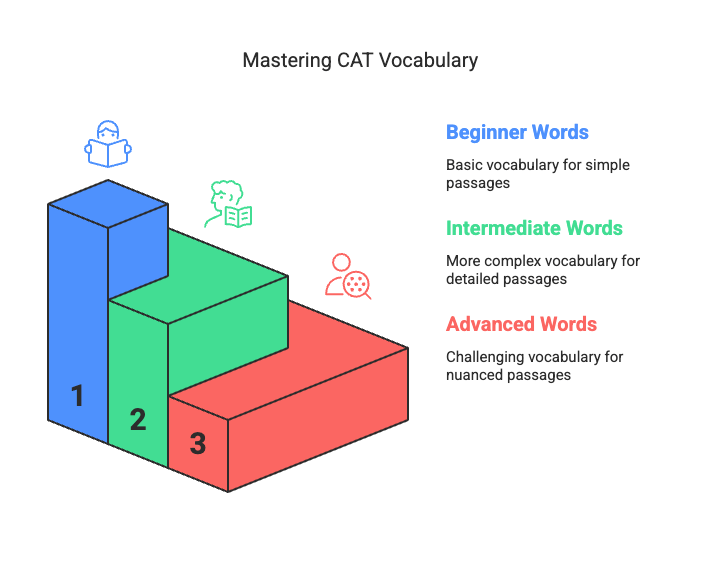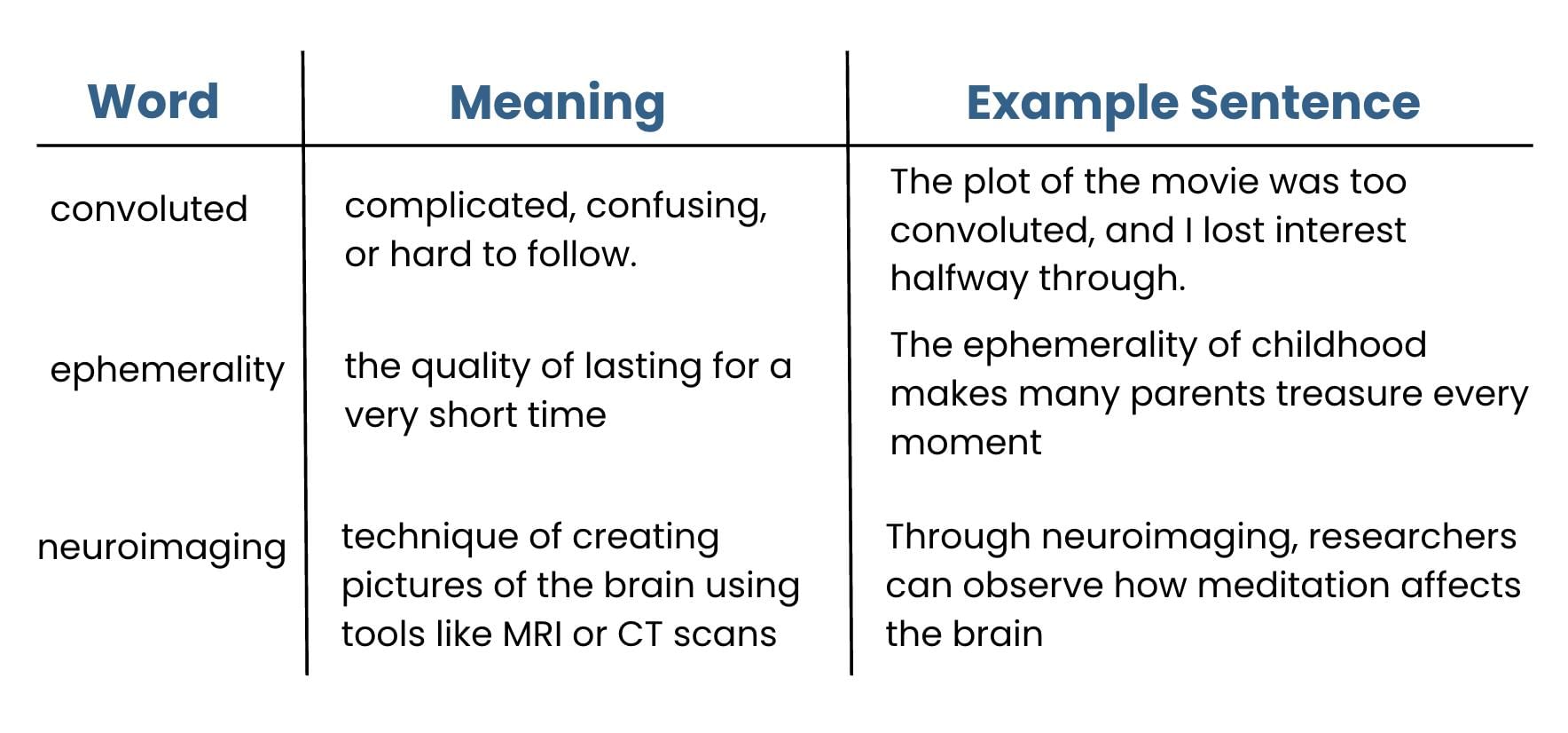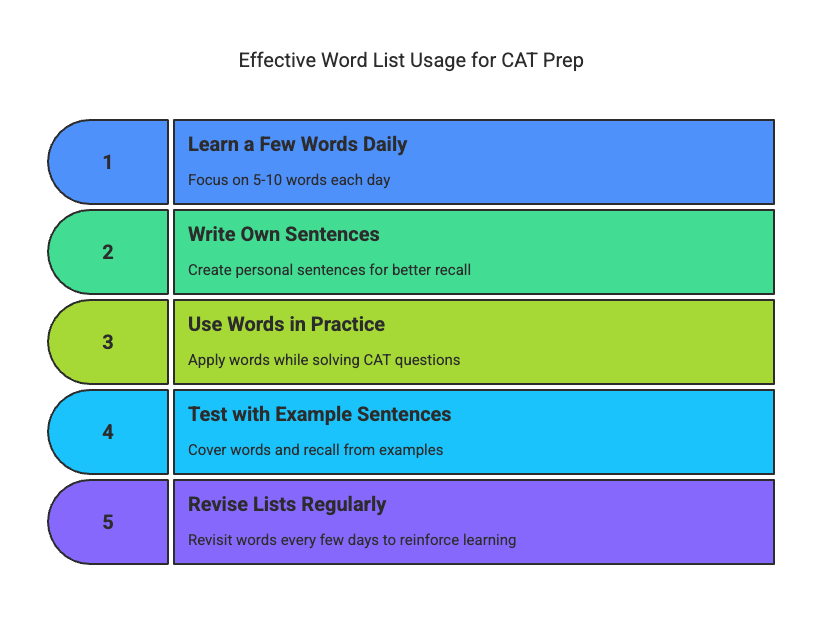Word Lists for CAT: What They Are and Why They Matter | Verbal Ability & Reading Comprehension (VARC) PDF Download
- Picture this: you’re deep in a CAT 2024 RC passage, and words like convoluted, ephemerality, or neuroimaging stop you cold. These aren’t just words—they’re gatekeepers to your dream MBA score.
- In the Verbal Ability and Reading Comprehension (VARC) section, a killer vocabulary turns dense texts into opportunities.
- Our handpicked word lists are your shortcut to mastering complex passages, acing tricky questions, and standing out.
- Get ready to conquer CAT with confidence!
What Are Word Lists?
- Word lists are collections of words that are commonly tested in the CAT exam, especially in the Verbal Ability (VA) and Reading Comprehension (RC) sections.
- Each word comes with its meaning and an example sentence to show how it’s used.
- We’ve already created these lists for you, organised into difficulty levels (Level 1 for easier words, Level 2 for intermediate, and Level 3 for advanced), so you don’t need to make your own—just use the ones we’ve provided!
- They’re designed to help you learn new words step by step and get familiar with the kind of language you’ll see in the CAT exam.

How Are Word Lists Structured?
Our word lists are organised in a simple format:
Word: The vocabulary word you need to learn.
Meaning: A clear definition of the word.
Example Sentence: A sentence showing how the word is used in context.

Why Are Word Lists Important for CAT?
Using the word lists we’ve provided can make a big difference in your CAT preparation. Here’s why they’re so helpful:
Helps You Understand RC Passages
RC passages in CAT often use advanced words that can make them hard to understand. Our word lists include words you’re likely to see in these passages. For example, if a passage uses a word meaning "sarcastic" to describe someone’s tone, knowing that word helps you answer questions about the author’s attitude or the passage’s main idea.
Improves Your Verbal Ability (VA) Score
VA questions like sentence completion, cloze tests, or para-jumbles often test your vocabulary. The words in our lists are chosen to match the type of language CAT uses. For instance, if a question asks you to fill in a blank with a word meaning "a large amount," knowing that word from our list will help you pick the right answer quickly.
Builds Confidence for the Exam
Learning the words from our lists makes you feel more prepared for the VARC section. When you recognise words in RC passages or VA questions, you’ll be more confident in your answers. This reduces guesswork, which is important since CAT has negative marking for wrong answers.
Saves Time During the Exam
When you’re familiar with the words in our lists, you can read passages and questions faster. You won’t need to stop and guess what a word means. For example, if a passage uses a word meaning "to make something up," you’ll understand it right away and move on to the questions.
Prepares You for Different Question Types
Our word lists help with many types of CAT questions such as:
Main Idea Questions: Knowing advanced words helps you understand the passage’s theme.
Sentence Completion: Words from our lists often fit perfectly in fill-in-the-blank questions.
Odd Sentence Out: Recognising words can help you spot a sentence that doesn’t match the others in tone or meaning.
How to Use Our Word Lists Effectively
We’ve already created the word lists for you, so your job is to use them in a smart way to boost your CAT prep. Here are some practical tips:
Learn a Few Words Every Day
Pick a small number of words from our list to learn each day—around 5 to 10. For example, on Day 1, you might focus on the first 5 words in the list. Read the word, its meaning, and the example sentence carefully. Then, try to recall the meaning and example later in the day to make sure it sticks.
Write Your Own Sentences
Each word in our list comes with an example sentence, but writing your own sentence helps you remember the word better. For example, if the list has a word meaning "to improve" with the example "She used accessories to improve her outfit," you could write: "I studied hard to improve my CAT score." This makes the word more personal and easier to recall.
Use the Words While Practising CAT Questions
As you solve RC passages or VA questions from mock tests or past papers, look for opportunities to use the words from our lists. For example, if a sentence completion question asks for a word meaning "eager," check if that word is in our list and use it. This helps you see how the words fit into real CAT questions.
Test Yourself with the Example Sentences
Cover the word in the list and read the example sentence to see if you can recall the word. For instance, if the example is "The politician had to take back his statement after the debate," try to remember the word that means "to take back something said." This is a great way to test your memory and understanding.
Revise the Lists Regularly
To keep the words fresh in your mind, revisit the list every few days. For example, if you learned 5 words on Monday, go back to them on Thursday and read the meanings and examples again. You can also rewrite the example sentences in your own words to reinforce your learning.

Common Mistakes to Avoid
Here are some mistakes CAT aspirants often make when using our word lists, and how to avoid them:
Skipping the Example Sentences: The examples in our lists show how the word is used in a real sentence. Don’t skip them—read them carefully to understand the word’s context.
Not Revising: If you don’t review the words, you might forget them before the exam. Set aside time each week to go over the lists you’ve studied.
Focusing Only on Meanings: Don’t just memorise the definition—pay attention to how the word is used in the example sentence so you can recognise it in the exam.
Trying to Learn Too Many Words at Once: Don’t rush through the list. Learning 5–10 words a day is better than trying to learn 50 and forgetting them all.
Bonus Tips for CAT Success
Here are some extra tips to help you get the most out of our word lists and do well in the CAT exam:
Read Actively: When you read articles (e.g., from The Hindu or Aeon), look for words from our lists. If you spot a word you’ve learned, like one meaning "a large group of people," it’ll help you remember it better.
Use Words in Daily Life: Try to use the words from our lists when you speak or write. For example, if a word means "to ask desperately," you could say to a friend, "I desperately asked my teacher for extra time."
Focus on CAT Patterns: Our lists include words often used in CAT, like words about emotions (e.g., "angry"), actions (e.g., "to persuade gently"), or descriptions (e.g., "seemingly endless"). Pay extra attention to these types of words.
Practice with Past Papers: Solve RC and VA questions from past CAT papers and see if any words from our lists appear. This helps you get used to spotting them in the exam.

Exercises to Build a Strong Vocabulary for CAT
1. Keep a Pocket Vocabulary Journal
Carry a small notebook or use a note-taking app. Each day, jot down 5 words from various sources. Write only the word, its meaning, and one short sentence you create.
Payoff: Takes 5 minutes daily, reinforces retention, and builds confidence for RC comprehension.
2. Word-in-Text Spotting
While practising CAT mock RCs or reading articles (e.g., The Hindu), highlight the important words in the text. Note when the same or similar word appears in the text to what you've already learned.
Payoff: Takes 3 minutes during practice, links words to CAT contexts for main idea questions.
3. Nightly Word Recap
Before sleep, pick 5 learned words. Say each word and its meaning aloud. If you forget one, check the list and retry the next night.
Payoff: 1-minute habit, boosts long-term recall, reduces guesswork in VA questions.
|
111 videos|452 docs|90 tests
|
FAQs on Word Lists for CAT: What They Are and Why They Matter - Verbal Ability & Reading Comprehension (VARC)
| 1. What are word lists and how are they created for the CAT exam? |  |
| 2. Why are word lists considered important for preparing for the CAT? |  |
| 3. How can candidates use word lists effectively in their CAT preparation? |  |
| 4. What are some common mistakes to avoid when using word lists for CAT preparation? |  |
| 5. What are some bonus tips for achieving success in the CAT exam? |  |





















